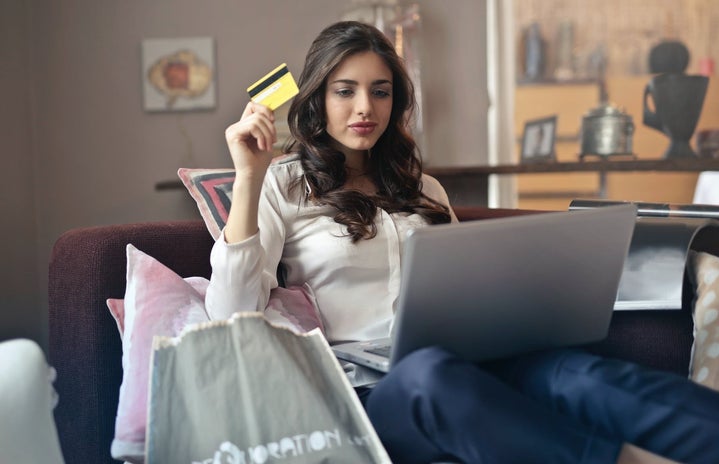For the first two months of the pandemic, I kept my spending under control. I didn’t dare to get into online shopping. I figured this lockdown will only last a few weeks— I’ve always preferred live-action shopping anyway. Once the stores finally opened again, they closed just as fast, with only a few months of physical consumerism to be had over the summer months.
As a rule, I try to keep my spending habits under control. Last school year, I paid for all my expenses while not working, which motivated me to save. But this year, living at home as well as working through the school year, deep into the second lockdown, I’m finding myself bored and spending money for no reason other than to waste time. I also know this situation is not unique to me. Talking with my friends in all kinds of economic situations, the general sentiment is that we’re all shopping for things we don’t need and buying clothes like we have places to be. My period of online Christmas shopping has dragged into the new year and has become for myself. As I catch all this happening, I think to myself, “Why can’t I stop shopping?”.
Why is the pandemic making us spend so much money?
We are in crisis mode. The entire world is in a panic, and everyone is responding in varied ways. Some days we try to solve our problems by baking banana bread. Other days we use fitness as a coping mechanism. When we’ve done enough of both of those, it is our instinct to spend. At its root, we feel it will promote our survival. Hence the toilet paper wipeout at the start of the pandemic. Shopping is a coping mechanism in response to not only the pandemic, but the additional challenges we’ve been confronted with as a result. We call it retail therapy for a reason. An article for Big Commerce equates pandemic spending habits with three psychological needs—the most important for us as young people being autonomy. As most of us live or have lived away from home and have just recently learned to take care of ourselves, the pandemic can make life seem out of control. So, to cope with the out-of-control world around us, we instead control the market. We shop. I’ve come to learn that my online shopping habits are a response to the isolated, out-of-control and insecure world I find myself becoming attuned to during the pandemic.
Personally, it’s out of character to so easily spend money on things I don’t really need. I’m conscious of my consumer habits, and I know that I have way more clothing than I need as it is. I recognize the negative consequences of shopping on Amazon, Zara, and Nike—yet I’m still clicking “complete order” as if they’re paying me to do it. Plain and simple, shopping is addictive and online shopping is so easy. At a time when I’m open to pretty much anything to fill my time and distract me from the depressing realities of the world, online shopping does the trick.

At what point does “treating yourself” become over-indulgence?
I’ve never really been one to treat myself. My mom taught me from a young age to understand the value of money, and that it is always better saved than spent where it doesn’t need to be spent. However, somewhere along the way, I developed a heavy guilt about “treating myself”. As much as I’ve gotten more comfortable doing this over the past year as my online shopping addiction has ramped up, I catch myself justifying my poor consumer habits with the fact that I’m just simply treating myself, and that I deserve it. There comes a point where the line needs to be drawn, where we go back to the simple truth: what I want and what I need are two very different things. Being able to buy what I want is a privilege that paves the way for overindulgence and overconsumption. The boredom and insecurities that come with the pandemic are very hard to resist, but I’ve come to the conclusion that they are not good enough excuses for my excess spending to ensue.
Where do we start in ending the spending?
It’s time to stage an intervention on my pandemic spending. Ultimately, I know that self-control is the secret weapon in refining my spending habits. If you’re in the same boat as me, here are some tips and thoughts on refining your own spending habits:
-
You do not have to carry around guilt for treating yourself occasionally. This can be good motivation to get things done. If you’re waiting to treat yourself to a big purchase, you should feel comfortable doing so, especially if it is something you are going to have and use for a long time to come. But, recognize when you’re simply buying whatever you want, whenever you want. Especially if you don’t really need it.
-
At the same time, consider alternatives to spending money on things you really don’t need. You can still reward yourself for getting stuff done. Dopamine is the brain chemical that makes us love to shop. Reward yourself with the feel-good chemical in other ways, by doing some self-care.
-
When possible, make sustainable shopping choices. @ssustainably_ on Instagram provides lots of information behind the products and brands we consume, the warning signs and the go-ahead for making smart purchases. Just informing yourself on the negative impacts of consumerism can often impact how we spend. Or, shop local. Buy from your friends. We all have friends with small business Instagram accounts. Redirect your funds that way.
-
Do not be afraid to take a break from spending altogether. This might be the intervention you need. While consumerism is notably “bad”, there are also many benefits to choosing a more minimalist lifestyle. Likewise, if you think it’s time to budget, try one of these finance management apps to get you started.
-
Finally, investing in experiences will bring you much greater joy than shopping. On a day-to-day basis, reward yourself with small things like getting outside to go for a walk or go on an adventure with a friend. I find it feels rewarding to drive somewhere removed from my familiar surroundings and go for a walk or a run to get a change of scenery. While it’s not as easy to envision now, take this downtime to save for your future travels. Look at Lonely Planet and research places you would love to go someday. Consider every Amazon or Urban Outfitters purchase you don’t make money in the bank to do bigger, more radical things like seeing the world. Let it become real in your head.




